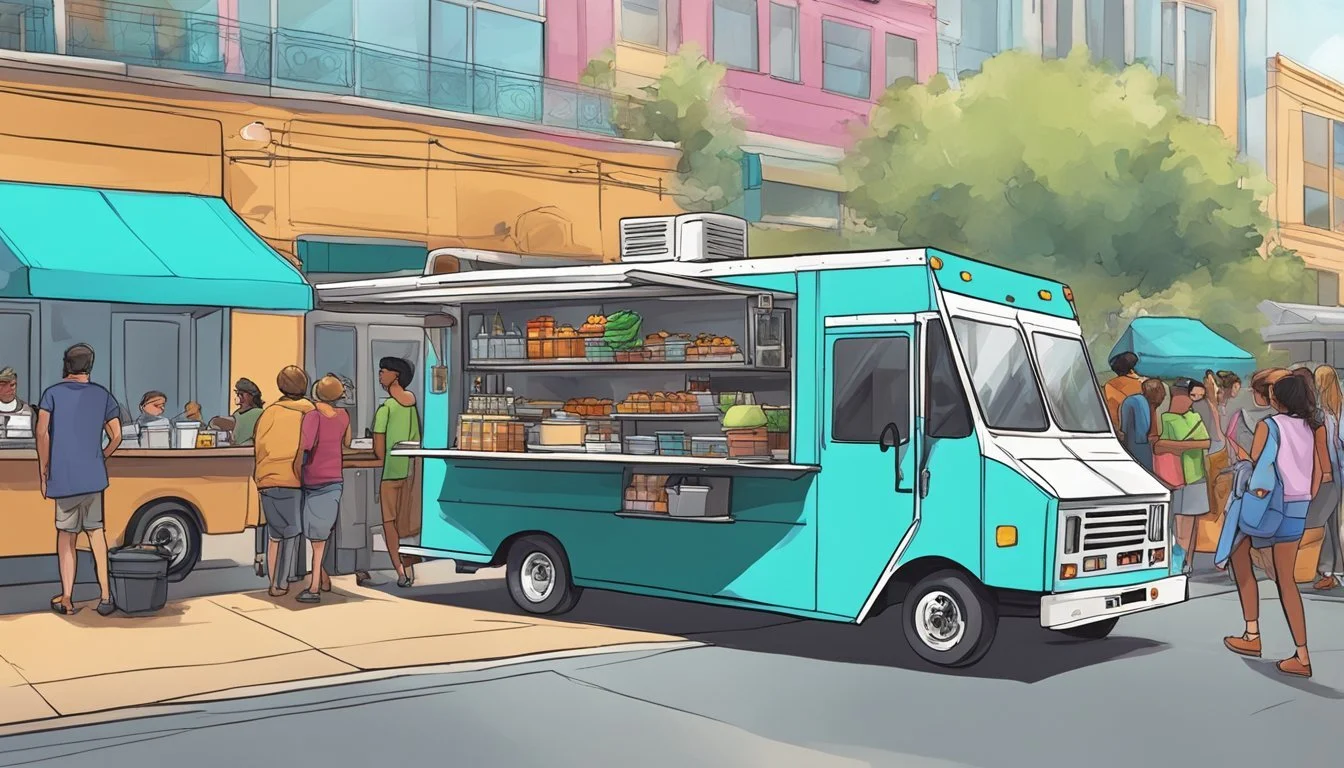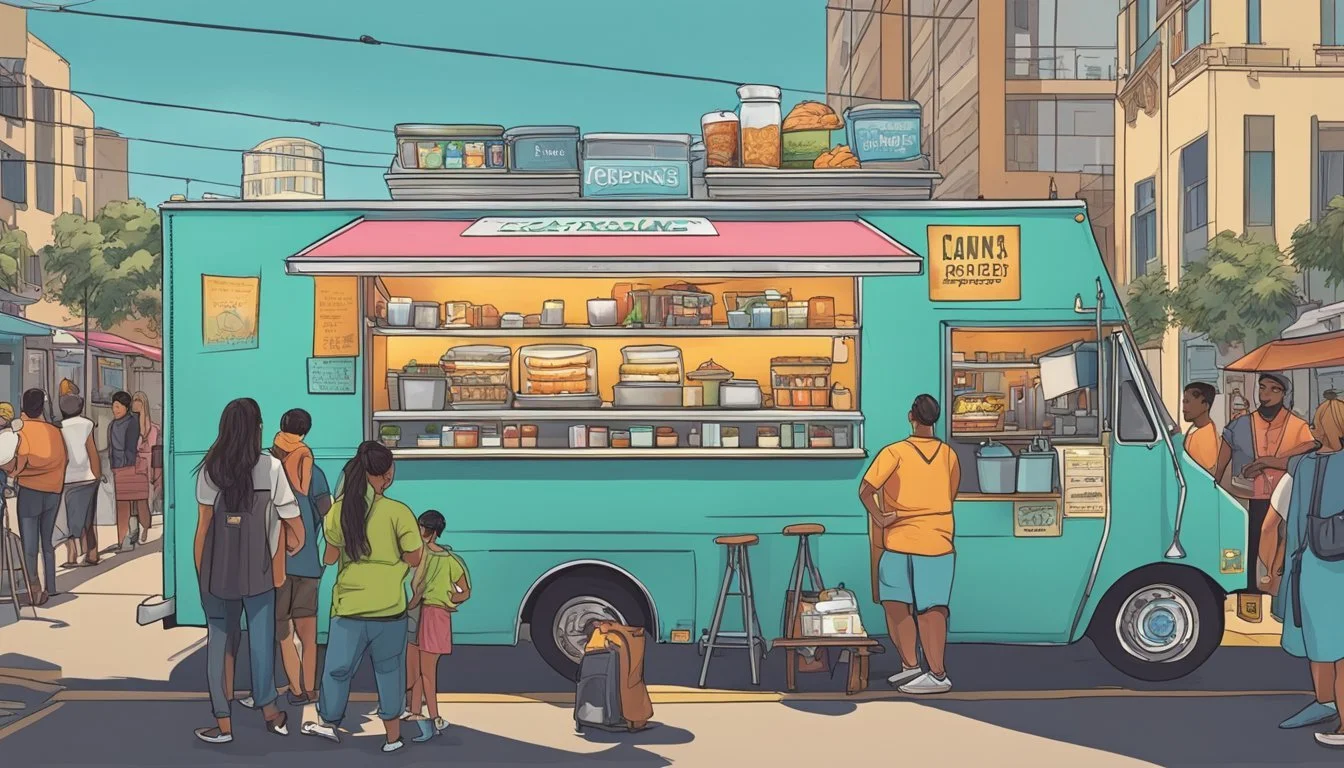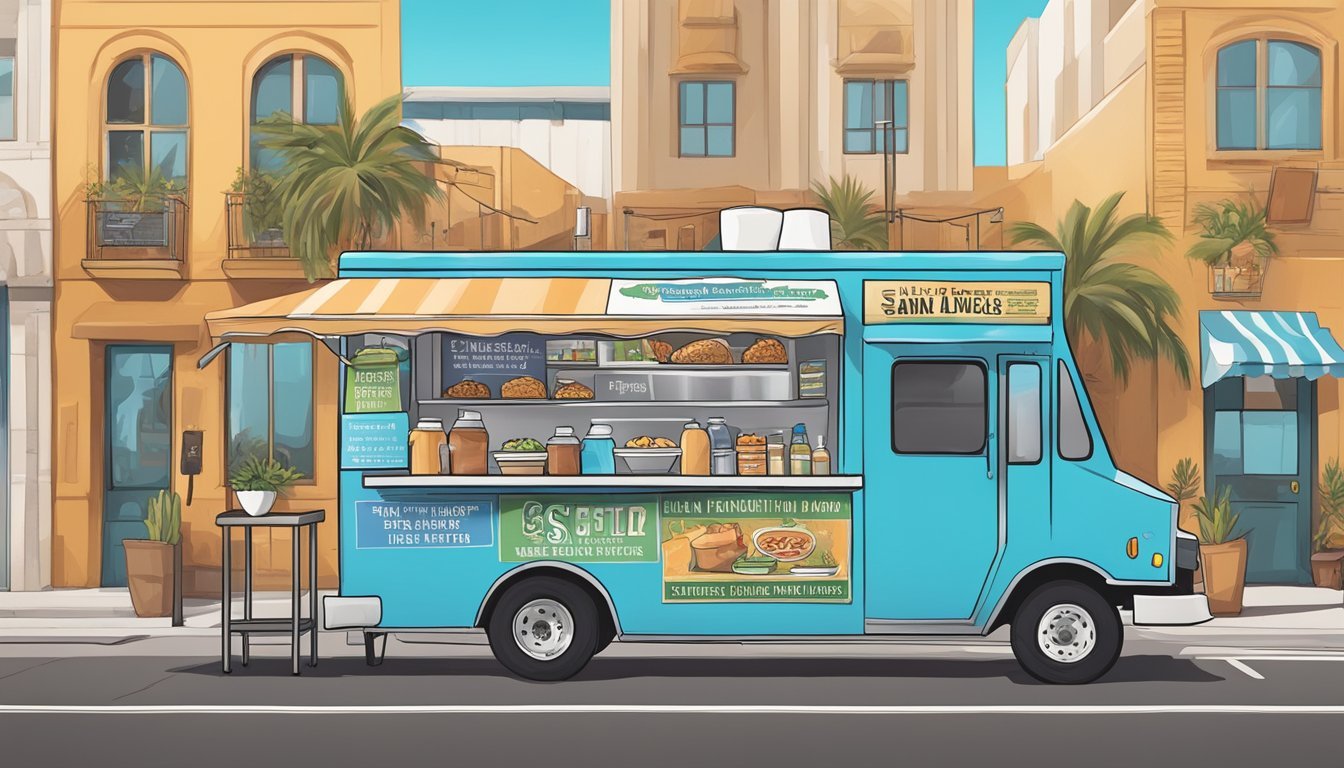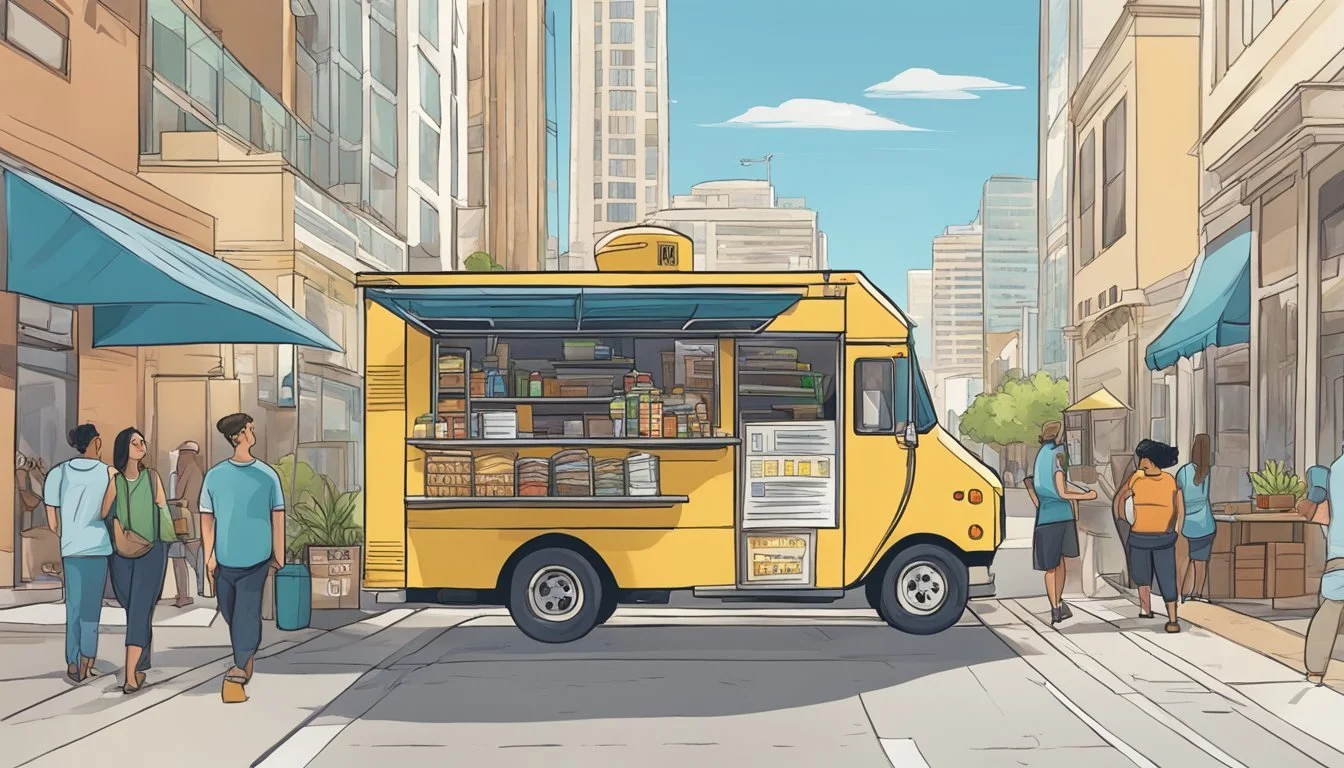Food Truck Laws San Diego, California
Your Comprehensive Guide
San Diego's vibrant street food culture is characterized by a diverse array of mobile food trucks offering everything from gourmet sandwiches to international cuisine. These roving restaurants have become a staple in the city's food scene, contributing to the local economy and providing accessible culinary options for residents and tourists alike. However, operating a mobile food truck in San Diego is subject to city and county regulations to ensure public health and safety.
To legally operate a food truck in San Diego, vendors must navigate a series of permits and licensing requirements set forth by the city. These include obtaining a Mobile Food Truck Permit from the City of San Diego as well as adhering to the California Retail Food Code. Compliance with these regulations ensures that mobile food facilities maintain standards for food safety, just as any brick-and-mortar restaurant would.
The County of San Diego takes an active role in regulating the food truck industry, under the direction of the Department of Environmental Health and Quality’s Food and Housing Division (DEH). They are responsible for over 1,200 mobile food facilities, making certain they do not pose health risks to the community. In addition to permits, food truck operators must also be conscious of zoning laws, parking restrictions, and food handling practices, which are enforced to maintain cleanliness and prevent any foodborne illnesses. Operators are encouraged to reference the DEH's handbook for detailed guidance on starting and maintaining a compliant food truck business.
Starting a Food Truck Business in San Diego
In San Diego, the food truck industry is deep-rooted and diverse, offering an array of opportunities for entrepreneurs. This bustling sector requires careful planning, a unique concept, and a solid business strategy to ensure success.
Understanding the Food Truck Scene
San Diego's food truck scene is as varied as its landscape, with trucks serving everything from traditional tacos to gourmet cuisine. Prospective food truck owners must research San Diego’s neighborhoods to determine the best locations for their culinary offerings. It's essential to familiarize oneself with local regulations, as food trucks are subject to various zoning and health department rules. A comprehensive understanding of the prerequisites from the City of San Diego Official Website for operating a food truck is critical.
Developing Your Food Truck Concept
A compelling and distinctive concept is crucial for any food truck. It should resonate with San Diego’s demographics and differentiate from existing food trucks in the area. Operators should craft their menu to reflect their theme, keeping in mind the popularity of the offerings and the logistics of serving food on-the-go. Creativity paired with practicality can make a concept shine and appeal to the wide-ranging tastes of San Diego's locals and visitors alike.
Developing a Business Plan
A business plan is the cornerstone of any successful food truck business. It should outline the costs, potential revenue, marketing strategies, and financing plans. Food truck entrepreneurs should estimate initial costs including the purchase of the truck, inventory, permits, and any modifications needed. Additionally, identifying ongoing expenses, such as staff wages, maintenance, and supply replenishment, helps in creating a realistic financial picture. Key components like a detailed marketing plan will play a significant role in the visibility and growth of the business.
Forming a Legal Entity and Financial Planning
Choosing to form an LLC can offer liability protection and potential tax benefits for a food truck business. San Diego entrepreneurs should consult with local government agencies and financial experts to understand the implications of different legal structures. Sound financial planning includes securing funding through loans, investments, or personal capital. Maintaining a detailed inventory system and regularly reviewing finances are good practices for any thriving small business in California's dynamic food truck industry.
Licensing and Permits
In San Diego, California, operating a food truck involves navigating through a set of specific licensing and permit requirements. These vary from business licensing to local zoning laws, each of which is crucial for legal operation.
Business Licensing Requirements
To legally operate a food truck in San Diego, one must first obtain a valid business license. This involves securing a business tax certificate from the City Treasurer's Office, which serves as proof of registered business operation within the city.
Health and Safety Permits
Food trucks are subject to the California Retail Food Code, requiring a County of San Diego Health Permit. The Health Department conducts regular inspections to ensure compliance with food safety regulations. Businesses must secure a public health permit for each mobile food facility they operate.
Special Permits for Events and Locations
When participating in special events or operating in certain locations, food trucks may need additional special event permits. This could include catering at a private event or setting up in particular zones that are not covered by the standard mobile food facility permit.
Local Laws and Zoning Regulations
The San Diego Municipal Code dictates the zones where food trucks can operate. Allowed zones are typically identified as industrial, commercial office, or certain "P" or "L" zones in residential areas. Each area comes with its own set of regulations and potential fees that must be recognized and adhered to.
Food Truck Operations
Operating a food truck in San Diego involves several key aspects, from choosing the right type of vehicle to navigating the logistics of maintaining your mobile food facility. Adherence to health and safety standards is paramount, and understanding the local laws will help ensure that food truck owners can operate successfully within the city’s vibrant culinary scene.
Choosing the Right Vehicle
Selecting a motorized vehicle that meets the requirements of a mobile food facility is an essential first step for food truck operators in San Diego. Cost and functionality go hand in hand; a food truck must accommodate the necessary kitchen equipment and adhere to San Diego's health codes. It’s important for vehicles to be large enough to prepare and store food safely, yet agile enough to navigate through bustling neighborhoods like the Gaslamp Quarter and Little Italy.
Selecting Profitable Locations
Location selection is crucial to the success of a food truck. Factors to consider include high foot traffic areas, proximity to offices, and popular public spaces. However, operators must comply with street vending regulations, especially when considering parking in areas with a high parking impact overlay zone. Profitable locations might include places near San Diego’s beaches, although restrictions apply to these areas.
Parking and Use of Public Spaces
The use of public-right-of-away spaces for food truck operations in San Diego comes with specific regulations to prevent issues related to traffic and pedestrian flow. Food truck owners need to familiarize themselves with the permissible areas for vending, which can vary from neighborhood to neighborhood. Certain locations, like beach areas or neighborhoods with street vending limitations, may require additional permits or have specific offsite delivery service rules.
Logistics of Food Truck Maintenance
Regular maintenance is an integral part of running a food truck business to ensure uninterrupted service and comply with health regulations. A reliable commissary provides a space for food prep and vehicle upkeep away from the public eye. The costs associated with food truck maintenance include cooking equipment service, vehicle repairs, and regular cleaning, all of which are vital for smooth operation and customer health and safety.
Marketing and Customer Engagement
Success in the food truck business in San Diego hinges not just on great food, but also on robust marketing and customer engagement strategies. The dynamic food truck scene in this city requires owners to develop a strong brand and community presence to stand out.
Building a Brand and Online Presence
Creating a consistent and memorable brand for a food truck is essential. This begins with a distinct name and visually appealing signage that captures the essence of the menu and personality of the business. An online presence, encompassing a professional website and active social media accounts, is crucial for brand awareness. Platforms like Instagram and Facebook are excellent for promoting the truck's location, menu specials, and enticing food photography. Regular updates and engagement with followers can transform customers into brand ambassadors.
Engaging with the Local Community
Networking within the local San Diego community is a key component for the growth of a food truck business. Participating in local events and food truck gatherings can help establish a strong community connection. Building relationships with event organizers and other local businesses can lead to collaborative opportunities and increased visibility. Food truck operators should also engage directly with their customers through interactive promotions and by encouraging feedback, fostering a loyal and supportive customer base.
Compliance and Best Practices
Operating a food truck in San Diego requires attention to detail and an understanding of laws and regulations to ensure a smooth and legal operation. From acquiring the correct permits to abiding by food safety standards and environmental practices, food truck operators must be diligent.
Adhering to San Diego Food Truck Laws
In San Diego, food truck operators must secure various permits before commencing business. They are required to comply with the San Diego Municipal Code and obtain a valid Mobile Food Truck Permit. Compliance with city council regulations is imperative for all mobile food facilities that sell or serve food, whether it is prepared on-site or prepackaged, and regardless of where it is consumed.
Health and Food Safety Standards
Food trucks in San Diego are subject to health department inspections to ensure adherence to the California Retail Food Code. These inspections assess food handling, preparation, and storage to guarantee standards that protect public health. Food safety is paramount, and it is up to the operators to ensure that their staff are fully trained and their operations meet all necessary food safety and health regulations.
Environmentally Sustainable Operations
San Diego's food truck operators are encouraged to adopt green practices, including waste reduction and sustainability measures. This includes using biodegradable containers, properly disposing of waste, and incorporating other environmentally friendly practices into their operations. These efforts not only foster a better environment but often resonate well with the community and customers.
Navigating Changes and Updates in Laws
Staying informed of new regulations is crucial for food truck operators. The government periodically updates laws and regulations, and it is the responsibility of the food truck owners to stay current and implement these changes promptly. They must also be aware of any fee updates associated with their permits and operations to avoid penalties.
Operators can check the latest in Mobile Food Facility regulation updates and Mobile Food Truck Permits for comprehensive guidance.
Resources and Frequently Asked Questions
When starting or operating a food truck in San Diego, it is crucial to navigate the specific resources and regulations set by the city and county authorities. Adequate knowledge of permits and adherence to the Municipal Code can pave a successful path for food truck operators.
City and County Resources
The City of San Diego offers a dedicated webpage with comprehensive details on obtaining a Mobile Food Truck Permit. This resource provides important information on the types of food trucks permitted and the process to secure the necessary approvals.
For county-level guidance, the County of San Diego has a substantial Mobile Food Facility Program aimed at regulating mobile food vendors. This includes a plethora of resources and supports to ensure food safety and compliance with health codes.
Municipal Code and Permit FAQs
Navigating the Municipal Code is made easier with resources like the Information Bulletin on how to obtain a permit for a Mobile Food Truck. This bulletin outlines the specific sections of the San Diego Municipal Code (SDMC) that apply to mobile food vendors.
For more direct inquiries, the city has developed a list of Frequently Asked Questions with clear, practical answers for mobile food facility operations. These can be found in documents such as the Operators' Handbook and FAQs, offering insight into everyday operational queries. They cover questions from approved commissaries to fee changes related to mobile food facilities.






